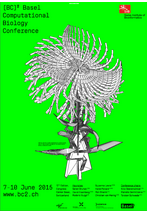T6: Human Microbiome Analysis: Computational Techniques and Challenges
Organizers:
Serghei Mangul (Institute for Quantitative and Computational Biosciences, University of California, Los Angeles)
Tutorial Summary:
Motivation
Microbial communities in and on the human body represent a complex mixture of microbial eukaryotes, bacteria, viruses and archaea containing in total more than ten times the number of genes found in the human genome. Traditional cultured-based methods are able to culture only small portion of known microbial species present in the human body. High-throughput sequencing offer a powerful culture-independent approach to study the underlying diversity of microbial communities in their natural habits across different human tissues and diseases. The detailed genomic and functional profile of the microbial communities provides a better understanding of how the human microbiome is assembled and maintained. Ability to access human microbiome richness at the various taxa level offers a promise to improve our understanding of how microbiome is involved in human health and disease. Comparative microbial analyses for multiple subject groups has a potential to establish healthy and disease specific microbiome composition. Studying the human microbiome in health and disease and establishing an association between disease and microbial gene pool may have important medical implications, including treatment of diseases with behavioral abnormalities. Additionally ability to identify prevalent microbial communities in individuals with various disorders relative to the general population may contribute to development of the microbiome-based diagnostic, prognostic, and treatment strategies. Additionally, accurate characterization of the personal microbiome and ability to compare it across individuals and diseases opens new possibilities to investigate host-microbiome interactions.
Expected Goals
The tutorial provides general introduction to computational techniques used to analyze human microbiome. We will summarize the main aspect of the human microbiome analyses highlighting the challenges and benefits of various approaches. In particular we provide the overview of existing reference-based and reference-free method to compare microbial communities across samples. We will highlight challenges and benefits associated with various steps of the human microbiome analyses.
During the tutorial we provide hands on expertise necessary to carry out microbiome analyses using next generation sequencing technologies. Participants will be able to:
- understand and apply next-generation sequencing technologies (including Illumina, 454, Ion Torrent, Pac Bio) for human microbiome analysis
- manage, interpret and assess the quality of sequencing data
- understand and apply protocols to extract candidate microbial reads from sequencing data
- acquire expertise necessary for using next‐generation sequence data for human microbiome analysis including read alignment, taxomic profiling, determining microbiota abundances and composition
- understand main computational and statistical techniques used in human microbiome analysis
- get hands on experience in working with UNIX command-line environment, allowing to use suggested human microbiome analysis pipelines
- confidently use the available tools for human microbime analyis on either a local or remote Unix system
- interpret and visualize the results
Prerequisites and intended audience
The tutorial is aimed at general audience who need or planning to use next-generation sequencing to study human microbiome or would like to get a general background of the field.
Attendees are strongly encouraged to bring a laptop computer able to access WiFi network. Attendees are encouraged to have cluster account (with UNIX OS). If cluster account is not available, personal laptop will be used for analysis, i.e. installing necessary computational tools, downloading the data and performing the analysis. Please reserve at least 20Gb of space on your laptop or cluster.
Tutorial speakers:
Serghei Mangul (Institute for Quantitative and Computational Biosciences, University of California, Los Angeles)
Tutorial Agenda
A web page for the tutorial can be found here, where you will find some scripts and examples.
Tuesday, June 9, 2015
| 14:00 – 15:00 | Welcome, Introduction to human microbiome analysis |
| 15:00 – 15:30 | Hands on session 1: Introduction to UNIX command-line |
| 15:30 – 16:00 | Coffee break |
| 16:00 – 17:30 | Hands on session 2: Human microbiome analysis – Genomic analysis of the microbial communities |
| 17:30 – 17:45 | Discussion and conclusions |







